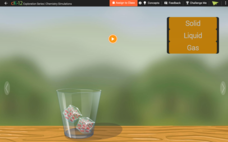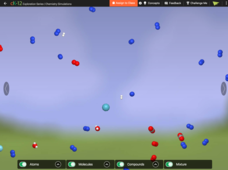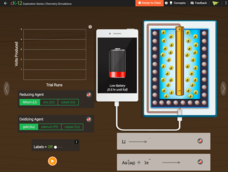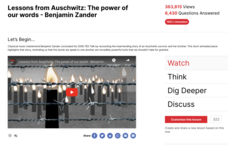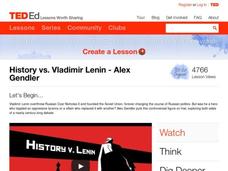CK-12 Foundation
Fish vs. Rose
Examine the science behind rates of diffusion. The video lesson and following interactive activity focus on the molecular components of different smells. Learners monitor the diffusion of each smell as they 'race' through a room.
CK-12 Foundation
Expand and Contract
Gaps are essential to engineering bridges and roads. Learners watch a video showing a typical construction of a bridge to see why they're so important. They then manipulate an interactive to model the effects of temperature change on the...
CK-12 Foundation
What's the Matter?
What makes ice, water, and steam different? Their molecular arrangements are the same, but their movements are different. Individuals make this conclusion by completing the simulation activity.
CK-12 Foundation
It's Just a Phase
Explore the phases of water as temperature rises. Pupils consider the idea that temperature remains constant during each phase change. An interactive exercise allows your young scientists to observe the temperature and molecular motion...
CK-12 Foundation
Air Matters
What makes up the air we breathe? Young scientists explore the atoms and molecules in the air. An interactive lesson allows individuals to watch the movement of the particles in the air and change the makeup from a mixture to a compound....
CK-12 Foundation
Don't Slip
Salt is the go-to material when people need to melt ice—learn the chemistry behind its effectiveness with an interactive lesson. Pupils watch a short narrative and then explore the concept through a simulation. Young scientists...
CK-12 Foundation
Soap
Examine the chemistry of the laundry room! A thorough video explains the polarity and non-polarity properties of soap. The tutorial continues to explain the advantage of these properties in stain removal by showing the bonding of the...
CK-12 Foundation
Balancing Equations
Make the microscopic world of chemical reactions come to life. An engaging video demonstrates a methane-oxygen reaction. Learners see the reaction take place and observe the chemical equation being balanced.
CK-12 Foundation
Battery
Don't take for granted the technology behind power packs. Build an understanding of the chemical mechanics of a battery pack that charges your phone. The simulation allows young scientists to manipulate the type of elements in a pack and...
CK-12 Foundation
Hotpack - Coldpack
Chemistry can help athletes and others protect and treat injuries. Use the interactive activity to explore the chemical reactions in instant hot and coldpacks. Learners manipulate the type of salt in the pack and watch the reaction take...
CK-12 Foundation
Crash
Explore the chemistry behind the airbags that keep you safe in a collision. Using a simulation, your classes find the best gas to use to inflate an airbag. The simulation shows the time it takes to inflate to a maximum volume....
CK-12 Foundation
Going Fishing
Why do some things float and others sink? A creative simulation allows learners to adjust mass and volume of an object to affect its buoyancy in water. A graph records the effect of each manipulation.
TED-Ed
A-rhythm-etic. The Math Behind the Beats
Your learners will dance in their seats as this talented drummer connects math to music in a short video clip. Clayton Cameron shows how math puts the "cool" in various genres of music, including jazz, hip-hop, pop, R&B, and others,...
TED-Ed
Pixar: The Math Behind the Movies
When will we ever use this? A Pixar movie maker explains to learners how math is used in the creation of animated films. The movie maker discusses the importance of coordinate planes, transformations and translations, and trigonometry.
TED-Ed
Bringing a Pop-up Book to Life
Breath life into the pages of a text with this instructional video on creating pop-up books. From choosing a topic, through the planning and creation phases, this video examines how to develop engaging visual presentations that reach out...
TED-Ed
Getting Started as a DJ: Mixing, Mashups and Digital Turntables
What do Paris Hilton, Avicii, Diplo, and Cole Plante all have in common? They're DJs! Seventeen-year-old Plante is featured in a short video in which he demonstrates his art and encourages others who might be interested in pursuing a DJ...
TED-Ed
How Does Your Brain Respond to Pain?
Zap! Ouch! That hurts! But why? And how come people don't experience or respond to pain in the same way? Take a journey on the sensing pathway, from your nociceptors, along your nerves, up your spinal cord, to neurons and glial, through...
TED-Ed
How Languages Evolve
Do all languages have a common ancestor? Although no one yet knows the answer to that big question, the narrator of this short, animated video explains how linguists use migration patterns, geological features, and word clues to...
TED-Ed
A Brief History of Religion in Art
Did you know that some languages have no word for art? The English language does and the narrator of this short video discusses the aesthetic dimension of religious art as it "visually communicates meaning beyond language."
TED-Ed
The Silk Road: Connecting the Ancient World Through Trade
Introduce learners to The Silk Road, the first world-wide web. The narrator of this short, animated video traces the pioneers of globalization and the impact they had on culture and economy. The Scythians, Darius the First, and Alexander...
TED-Ed
What is the World Wide Web?
Did you know that the World Wide Web and the Internet are not the same thing? Did you know that Tim Berners-Lee is considered the father of the Web? Networks, web servers, web hosts, website addresses, domain names, web languages,...
TED-Ed
Lessons from Auschwitz: The Power of Our Words
Some words are best left unspoken. Words matter, according to Benjamin Zander, conductor, teacher, and lecturer. To illustrate his point, Zander recounts a story told to him by a survivor of Auschwitz. As a result of her experience this...
TED-Ed
History vs. Vladimir Lenin
Vladimir Lenin is on trial in an engaging, animated video where the merits and consequences of the formation of the Soviet Union and Lenin's actions are reviewed. This is a great way to illustrate how to establish and argue unique...
TED-Ed
Different Ways of Knowing
“Words have colors, emotions, numbers, shapes, and personalities.” Daniel Tammet welcomes viewers to his world with a 10-minutes video that illustrates how he, as an autistic savant, perceives the world. Class members are then asked to...




